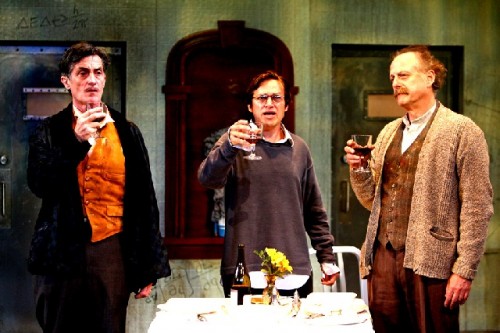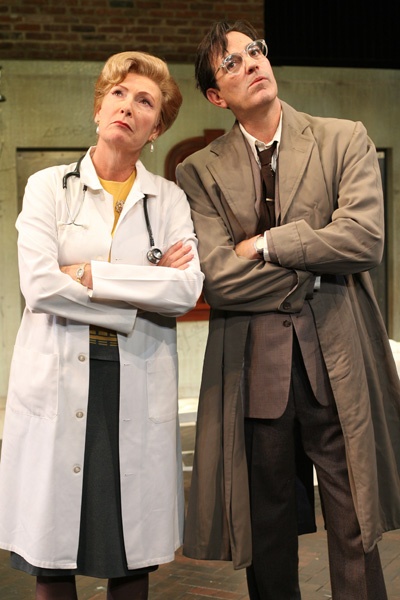The Physicists at Williamstown Theatre Festival
Nuclear Fission Sizzles
By: Charles Giuliano - Aug 09, 2007
The Physicists
By Friedrich Durrenmatt, Translated by James Kirkup
Directed by Kevin O'Rourke; sets, Alexander Dodge; costumes, Deborah A. Brothers; lights, Colin K. Bills: sound, David Sanderson; production stage manager, Jenny Dewar; production manager, Michael Wade; Casting Laura Schutzel, Tara Rubin Casting: Cast: (in order of appearance) Meggie Nidever (Police Officer/ Mrs. Rose), Kaveh Landsverk (Blocker/ Murillo), John Fletch (Police Inspector Richard Fox), Morgan Phillips-Spotts (Sister Boll), Roger Rees (Herbert George Butler/ Newton), Brenda Wehle (Doctor Mathilda van Zahnd), Mark Blum (Ernest Henry Ernesti/ Einstein), Cary Donaldson (Deacon Rose/ Louis Sievers, Chief Attendant), Rob Campbell (Jonathan William Mobius), Lydia Barnett-Mulligan (Monica Stettler).
Williamstown Theatre Festival. August 7-18.
http://www.wtfestival.org
In many ways "The Physicists" by Friedrich Durrenmatt, in a small stage, workshop production involving a combination of equity actors and members of the Williams College Summer Theatre Lab Students, is the most insightful and enjoyable play thus far in the season at the Williamstown Theatre Festival. Primarily, because it involves coming to the theatre to be engaged in critical thinking and not just an evening of entertainment. Good heavens, for that we have movies and television.
On every level this was an absolutely mad experience. The total gonzo plot cleverly had one wondering the most basic notions of sanity, insanity, a world gone mad in which the only refuge for the truly sane individual is to seek refuge in an asylum. Got that? Yeah, I know, it's a bit hard to swallow. But you have to trust me on this one.
The three main characters are deranged individuals with delusions that they are the famed Physicists; Newton, Einstein and Mobius. Or are they? It's all relative or relativity or whatever. It also appears that the nurses who attend them are victims of murder. But since the perpetrators are declared mentally incompetent, or are they, not murders, but as is discussed with a Police Inspector, not murders, but "assaults." Somebody who is commanded by the spirit of King Solomon to dispatch a nurse cannot be held responsible for a crime.
When interviewed by the Police Inspector (John Feltch) it is implied that Newton (Roger Rees) must be by now rather ancient. He tears off an absurd wig and declares "Of course I'm not Newton." Pause "I'm Einstein." But there is already another Einstein AKA Ernest Henry Ernesti (Mark Blum) initially heard off stage scratching away rather badly at the violin (as did the historical Einstein) accompanied by the chief psychiatrist and owner of the asylum, the attractive, middle aged, hunch backed, Doctor Mathilda von Zahnd (Brenda Wehle).
The inspector had investigated the demise of a nurse, a Karate champion, just three months prior, that night, and yet again as the final of the three nurses tending to the Physicists is later dispatched. He is growing rather weary of this and demands that the asylum switch to male attendants and tighter discipline.
But not before Mobius (Rob Campbell) dispatches nurse Monica Stettler (Lydia Barnett-Mulligan) whose only offense is declaring her love and the belief that he is not insane and must escape and marry her. In a bawdy interlude she straddles him to make a baby.
Just why are the three Physicists housed together? It seems that in her asylum Doctor van Zahnd likes to group like with like. But it later emerges that she has another darker intention. In the reversal of the play there are lots of twists and turns. It turns out that the three "patients" are not mad at all. They have in turn dispatched their nurses, whom they loved and feel truly remorseful for, because of obligations to protect their identities and greater missions. It appears that Einstein and Newton are not mad at all but represent competing clandestine services of which they are under cover agents. Their missions are to extract the results of the sixteen years of very real research of Mobius, the world's greatest living physicist, who has opted for this strange form of self imposed seclusion to solve some of the greatest conundrums of science. He gave up an academic career, family, the lure of fame and money to engage in pure science.
Unlike Einstein he does not want his theoretical research to result in such pragmatic destruction as weapons of mass destruction. How then to engage in pure science while inflicting no harm on mankind? So this mad farce is actually a morality play about the conflict between theoretical physics, science for the sake of science, and its destructive applications in the hands of the wrong agencies represented by the surrogates Einstein and Newton.
This play, presented as a farce, is rather like turning "Copenhagen" the famous meeting between Bohr and Heisenberg, two nuclear physicists, during World War Two and deconstructing their famous conflict and moral dilemma as a comedy. In many ways this play, with a different mandate to amuse, has much the same high minded agenda as the tough and demanding "Copenhagen." The latter play will be presented as part of the American Repertory Company season this Fall. We saw the play in London and I showed the PBS version to students in Humanities classes dealing with aspects of war and Holocaust.
The production sparkles. It was wonderful to see the artistic director of the WTF, Roger Rees, on stage in an absolutely deranged and delicious role. He must truly be as mad as the character he portrayed to have taken this on in addition to all of his other demanding responsibilities. His performance leaves no doubt as to why he is so widely respected. The combination of his skill on and off stage is truly inspirational. Rob Campbell's Mobius absolutely commanded and dominated this production. His permutations from rational to irrational, mad, sane, then, over the top and back again, was absolutely flawless. He was in complete control of every plot and character twist and turn. Mark Blum's Einstein was compelling but somewhat underwritten compared to the meatier parts of the other primary characters. And Brenda Wehl was convincing in the essential role of pulling together all of the loose ends of a most convoluted plot. Compared to her three certifiably insane patients it is no surprise that the therapist is truly off her rocker.
We walked out of the theatre not exactly whistling a happy tune but with deep and dark, lingering thoughts about the moral issues of theoretical physics. It reminded me of when Ronald Reagan in the early days of television, as host of General Electric Theatre, used to tell us that "At General Electric progress is our most important product." We believed him. Then he became president. I ask you was that progress? Today, do you really trust GE or any other major corporation? Or science for that matter? At least for an evening that moral dilemma was funny.



